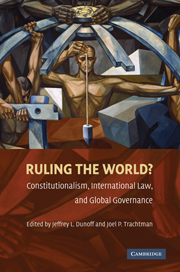Book contents
- Frontmatter
- Contents
- Contributors
- Preface: International Institutions: Why Constitutionalize?
- Acknowledgments
- PART I WHAT IS CONSTITUTIONALIZATION BEYOND THE STATE?
- PART II THE CONSTITUTIONAL DIMENSIONS OF SPECIFIC INTERNATIONAL REGIMES
- PART III CROSSCUTTING ISSUES
- 9 Human Rights and International Constitutionalism
- 10 The Cosmopolitan Turn in Constitutionalism: On the Relationship between Constitutionalism in and beyond the State
- 11 Constitutional Heterarchy: The Centrality of Conflict in the European Union and the United States
- 12 Courts and Pluralism: Essay on a Theory of Judicial Adjudication in the Context of Legal and Constitutional Pluralism
- 13 Whose Constitution(s)? International Law, Constitutionalism, and Democracy
- Index
- References
10 - The Cosmopolitan Turn in Constitutionalism: On the Relationship between Constitutionalism in and beyond the State
Published online by Cambridge University Press: 05 June 2012
- Frontmatter
- Contents
- Contributors
- Preface: International Institutions: Why Constitutionalize?
- Acknowledgments
- PART I WHAT IS CONSTITUTIONALIZATION BEYOND THE STATE?
- PART II THE CONSTITUTIONAL DIMENSIONS OF SPECIFIC INTERNATIONAL REGIMES
- PART III CROSSCUTTING ISSUES
- 9 Human Rights and International Constitutionalism
- 10 The Cosmopolitan Turn in Constitutionalism: On the Relationship between Constitutionalism in and beyond the State
- 11 Constitutional Heterarchy: The Centrality of Conflict in the European Union and the United States
- 12 Courts and Pluralism: Essay on a Theory of Judicial Adjudication in the Context of Legal and Constitutional Pluralism
- 13 Whose Constitution(s)? International Law, Constitutionalism, and Democracy
- Index
- References
Summary
Introduction
Constitutionalism beyond the State? The Skeptic's Challenge
The language of constitutionalism has become widespread among international lawyers. International law as a whole or specific international regimes are described using constitutional language. Yet from the perspective of many national constitutional lawyers – not only, but particularly, in the United States – the application of constitutional language to international law is viewed with skepticism. A constitution, in the modern tradition, is generally understood as the supreme law of a sovereign state. The constitution is a written document, imagined as constituting and authorized by “We the People,” enforced, if need be, by the coercive power of the state. International law, on the other hand, is conventionally imagined as the law among states, founded on the consent of states, and addressing questions of foreign affairs. Within this dualist paradigm, any talk of constitutionalism beyond the state is deeply implausible. Whoever uses the language of constitutionalism in relation to public international law is suspected of effectively advocating some version of a constitutional world state. Given the central role that sovereign states play and are likely to continue to play in the international system, such ideas, whatever their merit from a purely moral point of view might be, are easily dismissed as hopelessly out of touch with reality and certainly of little value for the analysis and assessment of international law as it exists today.
- Type
- Chapter
- Information
- Ruling the World?Constitutionalism, International Law, and Global Governance, pp. 258 - 325Publisher: Cambridge University PressPrint publication year: 2009
References
- 88
- Cited by



